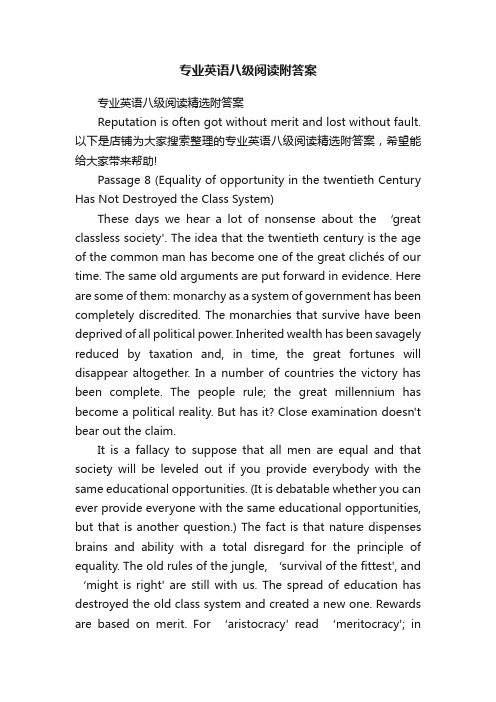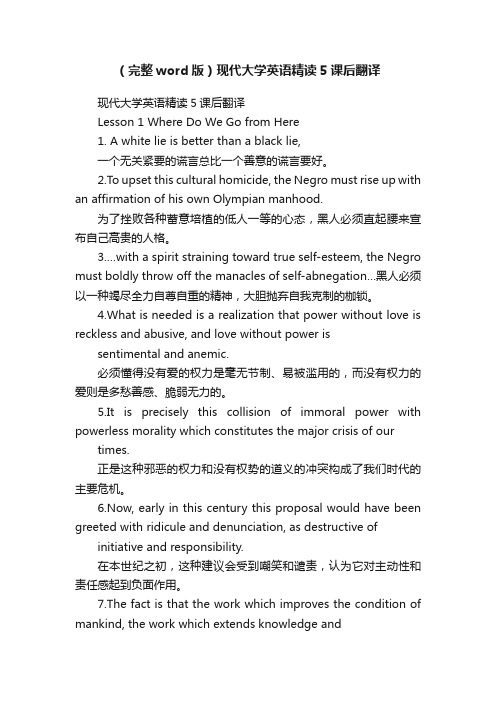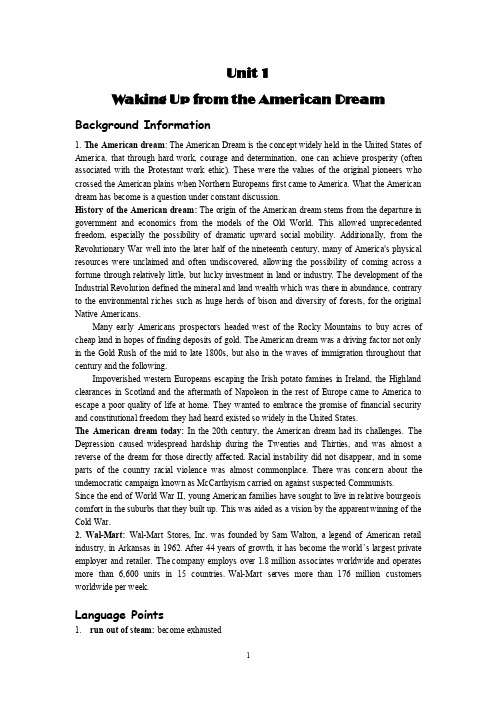思想政治专业英语第五课 参考译文
专业英语八级阅读附答案

专业英语八级阅读附答案专业英语八级阅读精选附答案Reputation is often got without merit and lost without fault.以下是店铺为大家搜索整理的专业英语八级阅读精选附答案,希望能给大家带来帮助!Passage 8 (Equality of opportunity in the twentieth Century Has Not Destroyed the Class System)These days we hear a lot of nonsense about the ‘great classless society'. The idea that the twentieth century is the age of the common man has become one of the great clichés of our time. The same old arguments are put forward in evidence. Here are some of them: monarchy as a system of government has been completely discredited. The monarchies that survive have been deprived of all political power. Inherited wealth has been savagely reduced by taxation and, in time, the great fortunes will disappear altogether. In a number of countries the victory has been complete. The people rule; the great millennium has become a political reality. But has it? Close examination doesn't bear out the claim.It is a fallacy to suppose that all men are equal and that society will be leveled out if you provide everybody with the same educational opportunities. (It is debatable whether you can ever provide everyone with the same educational opportunities, but that is another question.) The fact is that nature dispenses brains and ability with a total disregard for the principle of equality. The old rules of the jungle, ‘survival of the fittest', and ‘might is right' are still with us. The spread of education has destroyed the old class system and created a new one. Rewards are based on merit. For ‘aristocracy' read ‘meritocracy'; inother respects, society remains unaltered: the class system is rigidly maintained.Genuine ability, animal cunning, skill, the knack of seizing opportunities, all bring material rewards. And what is the first thing people do when they become rich? They use their wealth to secure the best possible opportunities for their children, to give them ‘a good start in life'. For all the lip service we pay to the idea of equality, we do not consider this wrong in the western world. Private schools which offer unfair advantages over state schools are not banned because one of the principles in a democracy is that people should be free to choose how they will educate their children. In this way, the new meritocracy can perpetuate itself to a certain extent: an able child from a wealthy home can succeed far more rapidly than his poorer counterpart. Wealth is also used indiscriminately to further political ends. It would be almost impossible to become the leader of a democracy without massive financial backing. Money is as powerful a weapon as ever it was.In societies wholly dedicated to the principle of social equality, privileged private education is forbidden. But even here people are rewarded according to their abilities. In fact, so great is the need for skilled workers that the least able may be neglected. Bright children are carefully and expensively trained to become future rulers. In the end, all political ideologies boil down to the same thing: class divisions persist whether you are ruled by a feudal king or an educated peasant.1. What is the main idea of this passage?[A] Equality of opportunity in the twentieth century has not destroyed the class system.[B] Equality means money.[C] There is no such society as classless society.[D] Nature can't give you a classless society.2. According to the author, the same educational opportunities can't get rid of inequality because ___________[A] the principle ‘survival of the fi ttest' exists.[B] Nature ignores equality in dispensing brains and ability.[C] Material rewards are for genuine ability.[D] People have the freedom how to educate their children.3. Who can obtain more rapid success ___________[A] those with wealth.[B] Those with the best brains.[C] Those with the best opportunities.[D] Those who have the ability to catch at opportunities.4. Why does the author say the new meritocracy can perpetuate itself to a certain extent? Because ___________[A] money decides everything.[B] Private schools offer advantages over state schools.[C] People are free to choose the way of educating their children.[D] Wealth is used for political ends.5. According to the author, class divisions' refers to ___________[A] the rich and the poor.[B] Different opportunities for people.[C] Oppressor and the oppressed.[D] Genius and stupidity.Vocabulary1. discredit 损害,破坏,败坏(某人的名声),不可信2. monarch 国王,女皇,君主政体3. millennium 千年the millennium 千僖年4. bear out 证实5. level out (升跌之后)呈平稳状态6. meritocracy 英才管理,英才教育,能人统治7. knack 技巧,诀窍8. perpetuate 使永久,永存或持续9. indiscriminate 不加鉴别的,不加分析的,任意的10. boil down 归结为……难句译注1. Close examination doesn't bear out the claim.【参考译文】深入探索证实此断言不确。
(完整word版)现代大学英语精读5课后翻译

(完整word版)现代大学英语精读5课后翻译现代大学英语精读5课后翻译Lesson 1 Where Do We Go from Here1. A white lie is better than a black lie,一个无关紧要的谎言总比一个善意的谎言要好。
2.To upset this cultural homicide, the Negro must rise up with an affirmation of his own Olympian manhood.为了挫败各种蓄意培植的低人一等的心态,黑人必须直起腰来宣布自己高贵的人格。
3.…with a spirit straining toward true self-esteem, the Negro must boldly throw off the manacles of self-abnegation…黑人必须以一种竭尽全力自尊自重的精神,大胆抛弃自我克制的枷锁。
4.What is needed is a realization that power without love is reckless and abusive, and love without power issentimental and anemic.必须懂得没有爱的权力是毫无节制、易被滥用的,而没有权力的爱则是多愁善感、脆弱无力的。
5.It is precisely this collision of immoral power with powerless morality which constitutes the major crisis of our times.正是这种邪恶的权力和没有权势的道义的冲突构成了我们时代的主要危机。
6.Now, early in this century this proposal would have been greeted with ridicule and denunciation, as destructive of initiative and responsibility.在本世纪之初,这种建议会受到嘲笑和谴责,认为它对主动性和责任感起到负面作用。
研究生英语高级教程课文参考译文

Unit 1Waking Up from the American Dream Background Information1. The American dream: The American Dream is the concept widely held in the United States of America, that through hard work, courage and determination, one can achieve prosperity (often associated with the Protestant work ethic). These were the values of the original pioneers who crossed the American plains when Northern Europeans first came to America. What the American dream has become is a question under constant discussion.History of the American dream: The origin of the American dream stems from the departure in government and economics from the models of the Old World. This allowed unprecedented freedom, especially the possibility of dramatic upward social mobility. Additionally, from the Revolutionary War well into the later half of the nineteenth century, many of America's physical resources were unclaimed and often undiscovered, allowing the possibility of coming across a fortune through relatively little, but lucky investment in land or industry. The development of the Industrial Revolution defined the mineral and land wealth which was there in abundance, contrary to the environmental riches such as huge herds of bison and diversity of forests, for the original Native Americans.Many early Americans prospectors headed west of the Rocky Mountains to buy acres of cheap land in hopes of finding deposits of gold. The American dream was a driving factor not only in the Gold Rush of the mid to late 1800s, but also in the waves of immigration throughout that century and the following.Impoverished western Europeans escaping the Irish potato famines in Ireland, the Highland clearances in Scotland and the aftermath of Napoleon in the rest of Europe came to America to escape a poor quality of life at home. They wanted to embrace the promise of financial security and constitutional freedom they had heard existed so widely in the United States.The American dream today: In the 20th century, the American dream had its challenges. The Depression caused widespread hardship during the Twenties and Thirties, and was almost a reverse of the dream for those directly affected. Racial instability did not disappear, and in some parts of the country racial violence was almost commonplace. There was concern about the undemocratic campaign known as McCarthyism carried on against suspected Communists. Since the end of World War II, young American families have sought to live in relative bourgeois comfort in the suburbs that they built up. This was aided as a vision by the apparent winning of the Cold War.2. Wal-Mart:Wal-Mart Stores, Inc. was founded by Sam Walton, a legend of American retail industry, in Arkansas in 1962. After 44 years of growth, it has become the world‘s largest private employer and retailer. The company employs over 1.8 million associates worldwide and operates more than 6,600 units in 15 countries. Wal-Mart serves more than 176 million customers worldwide per week.Language Points1.run out of steam: become exhausted2.Upward mobility diminished even more in the 1980s as globalization and technologyslammed blue-collar wages: ―Slammed‖ here means ―make…slip rapidly‖. 3.…minting dot-com millionaires by the thousands, …: A lot of people became millionairesby running websites in 1990s when the economy was booming.4.It’s hard to find a job with a career ladder these days, and a B.A. would be an edge: It‘shard to find a job that can provide opportunity to move up these days and those with a B.A.would have advantage over others.5.Restoring American mobility is less a question of knowing what to do than of making ithappen: Restoring American mobility is a question of making it happen rather than a question of knowing what to do.Answer keysI. Reading ComprehensionA. 1. A 2. D 3. D 4. C 5. A 6. D 7. C 8. D 9. A10. BB.Open.II. VocabularyA. 1. C 2. D 3. A 4. B 5. D 6. C 7. C 8. C 9. D 10. AB. 1. A 2. B 3. C 4. A 5. B 6. D 7. A8. D 9. B 10. C III. Cloze1. A2. B3. D4. A5. C6. A7. B8. C9. B 10. DIV. TranslationA. 壳牌公司努力构建的管理风格是让雇员直接参与影响其工作的决策。
新视野大学英语第四册unit5单词翻译总结

英语Unit 5 总结Word and Phrasesolitary a. tending to spend a lot of time alone 独自的;喜欢独处的e.g. A solitary tree remained standing after the hurricane. 飓风过后,惟有一棵树孤独地挺立在那儿。
tame vt. make sb. or sth. easy to control 驯服;控制e.g. Atomic energy has been tamed and harnessed for useful work. 原子能已被控制并得到实际应用。
a. (esp. of animals) not afraid of people, and used to living with them (尤指动物)温顺的,驯化的e.g. The birds in the park are quite tame and will take food from your hand. 公园的鸟很温顺,它们会吃你亲手喂给它们的食物。
pond n. [C] a small still body of water formed naturally or created artificially 池塘 She has a pond at the bottom of her garden. 她在花园深处有个池塘。
inspiration n. [C, U] a sudden good idea about what to do or say 灵感e.g. Wordsworth found (his) inspiration in the Lake District. 华兹华斯从湖区获得灵感。
solitude n. [U] the situation of being alone 独居,孤独e.g. People need a chance to reflect on spiritual matters in solitude. 人们需要独处的机会来反思精神上的事情。
李观仪《新编英语教程(5)》(第3版)学习指南【词汇短语+课文精解+全文翻译+练习答案】

李观仪《新编英语教程(5)》(第3版)学习指南【词汇短语+课文精解+全文翻译+练习答案】目录Unit 1 一、词汇短语 二、参考译文 三、课文注释 四、练习答案Unit 2 一、词汇短语 二、参考译文 三、课文注释 四、练习答案Unit 3 一、词汇短语 二、参考译文 三、课文注释 四、练习答案Unit 4 一、词汇短语 二、参考译文 三、课文注释 四、练习答案Unit 5 一、词汇短语 二、参考译文 三、课文注释 四、练习答案Unit 6 一、词汇短语 二、参考译文 三、课文注释 四、练习答案Unit 7 一、词汇短语 二、参考译文 三、课文注释 四、练习答案Unit 8 一、词汇短语 二、参考译文 三、课文注释 四、练习答案Unit 9 一、词汇短语 二、参考译文 三、课文注释 四、练习答案Unit 10 一、词汇短语 二、参考译文 三、课文注释 四、练习答案Unit 11 一、词汇短语 二、参考译文 三、课文注释 四、练习答案Unit 12 一、词汇短语 二、参考译文 三、课文注释 四、练习答案弘博学习网————各类考试资料全收录内容简介《新编英语教程(第3版)学习指南》按照原教材的课次进行编写,每单元涉及单元语法、词汇短语、参考译文、课文精解以及练习答案等内容,旨在帮助学生更好、更高效地学习和掌握教材中的重点及难点知识,具有很强的针对性和实用性。
在编写过程中,该书力求突出重点,答疑难点,语言言简意赅,讲解深入浅出,希望它能得到广大英语专业学生和英语自学者的喜爱和认可。
弘博学习网————各类考试资料全收录Unit 1一、词汇短语Text I1clumsy [5klQmzi] adj. moving or doing things in a very awkward way 笨拙的,拙劣的:I spilt your coffee. Sorry—that was clumsy of me.我把你的咖啡弄洒了。
1995-2008年英语专业八级考试真题翻译及参考译文

1995-2008年英语专业八级考试真题翻译及参考译文1995年英语专业八级考试--翻译部分参考译文C-E原文:简.奥斯丁的小说都是三五户人家居家度日,婚恋嫁娶的小事。
因此不少中国读者不理解她何以在西方享有那么高的声誉。
但一部小说开掘得深不深,艺术和思想是否有过人之处,的确不在题材大小。
有人把奥斯丁的作品比作越咀嚼越有味道的橄榄。
这不仅因为她的语言精彩,并曾对小说艺术的发展有创造性的贡献,也因为她的轻快活泼的叙述实际上并不那么浅白,那么透明。
史密斯夫人说过,女作家常常试图修正现存的价值秩序,改变人们对“重要”和“不重要”的看法。
也许奥斯丁的小说能教我们学会转换眼光和角度,明察到“小事”的叙述所涉及的那些不小的问题。
参考译文:However, subject matter is indeed not the decisive factor by which we judge a novel of its depth as well as (of ) its artistic appeal and ideological content (or: as to whether a novel digs deep or not or whether it excels in artistic appeal and ideological content). Some people compare Austen’s works to olives: the more you chew them, the more tasty (the tastier) they become. This comparison is based not only on (This is not only because of ) her expressive language and her creative contribution to the development of novel writing as an art, but also on (because of ) the fact that what hides behind her light and lively narrative is something implicit and opaque (not so explicit and transparent). Mrs. Smith once observed, women writers often sought (made attempts) to rectify the existing value concepts (orders) by changing people’s opinions on what is ―important‖ and what is not.E-C原文I, by comparison, living in my overpriced city apartment, walking to work past putrid sacks of street garbage, paying usurious taxes to local and state governments I generally abhor, I am rated middle class. This causes me to wonder, do the measurement make sense? Are we measuring only that which is easily measured--- the numbers on the money chart --- and ignoring values more central to the good life?For my sons there is of course the rural bounty of fresh-grown vegetables, line-caught fish and the shared riches of neighbours’ orchards and gardens. There is the unpaid baby-sitter for whose children my daughter-in-law baby-sits in return, and neighbours who barter their skills and labour. But more than that, how do you measure serenity? Sense if self?I don’t want to idealize life in small places. There are times when the outside world intrudes brutally, as when the cost of gasoline goes up or developers cast their eyes on untouched farmland. There are cruelties, there is intolerance, there are all the many vices and meannesses in small places that exist in large cities. Furthermore, it is harder to ignore them when they cannot be banished psychologically to another part of town or excused as the whims of alien groups --- when they have to be acknowledged as ―part of us.‖Nor do I want to belittle the opportunities for small decencies in cities --- the eruptions of one-stranger-to-another caring that always surprise and delight. But these are,sadly,more exceptions than rules and are often overwhelmed by the awful corruptions and dangers thatsurround us.参考译文:对我的几个儿子来说,乡村当然有充足的新鲜蔬菜,垂钓来的鱼,邻里菜园和果园里可供分享的丰盛瓜果。
新视野大学英语5课文ABC全篇翻译
1.AA Technological Revolution in Education教育界的科技革命如果让生活在1900年的人来到我们这个时代,他会辨认出我们当前课堂里发生的许多事情——那盛行的讲座、对操练的强调、从基础读本到每周的拼写测试在内的教学材料和教学活动。
可能除了教堂以外,很少有机构像主管下一代正规教育的学校那样缺乏变化了。
让我们把上述一贯性与校园外孩子们的经历作一番比较吧。
在现代社会,孩子们有机会接触广泛的媒体,而在早些年代这些媒体简直就是奇迹。
来自过去的参观者一眼就能辨认出现在的课堂,但很难适应现今一个10岁孩子的校外世界。
学校——如果不是一般意义上的教育界——天生是保守的机构。
我会在很大程度上为这种保守的趋势辩护。
但变化在我们的世界中是如此迅速而明确,学校不可能维持现状或仅仅做一些表面的改善而生存下去。
的确,如果学校不迅速、彻底地变革,就有可能被其他较灵活的机构取代。
计算机的变革力当今时代最重要的科技事件要数计算机的崛起。
计算机已渗透到我们生活的诸多方面,从交通、电讯到娱乐等等。
许多学校当然不能漠视这种趋势,于是也配备了计算机和网络。
在某种程度上,这些科技辅助设施已被吸纳到校园生活中,尽管他们往往只是用一种更方便、更有效的模式教授旧课程。
然而,未来将以计算机为基础组织教学。
计算机将在一定程度上允许针对个人的授课,这种授课形式以往只向有钱人提供。
所有的学生都会得到符合自身需要的、适合自己学习方法和进度的课程设置,以及对先前所学材料、课程的成绩记录。
毫不夸张地说,计算机科技可将世界上所有的信息置于人们的指尖。
这既是幸事又是灾难。
我们再也无须花费很长时间查找某个出处或某个人——现在,信息的传递是瞬时的。
不久,我们甚至无须键入指令,只需大声提出问题,计算机就会打印或说出答案,这样,人们就可实现即时的"文化脱盲"。
美中不足的是,因特网没有质量控制手段;"任何人都可以拨弄"。
新编英语教程5课文1-5翻译
新编英语教程5课文翻译Unit One 恰到好处你见过一个笨手笨脚的男人往箱子上钉钉子吗?只见他左敲敲,右敲敲,说不准还会将整个钉子锤翻,结果敲来敲去到头来只敲进了半截。
而娴熟的木匠就不这么干。
他每敲一下都会坚实巧妙地正对着钉头落下去,一钉到底。
语言也是如此。
一位优秀的艺术家谴词造句上力求准确而有力地表达自己的观点。
差不多的词,不准确的短语,摸棱两可的表达,含糊不清的修饰,都无法使一位追求纯真英语的作家满意。
他会一直思考,直至找到那个能准确表达他的意思的词。
法国人有一个很贴切的短语来表达这样一个意思,即“le mot juste”, 恰到好处的词。
有很多关于精益求精的作家的名人轶事,比如福楼拜常花几天的时间力求使一两个句子在表达上准确无误。
在浩瀚的词海中,词与词之间有着微妙的区别,要找到能恰如其分表达我们意思的词绝非易事。
这不仅仅是扎实的语言功底和相当大的词汇量的问题,还需要人们绞尽脑汁,要观察敏锐。
选词是认识过程的一个步骤,也是详细描述我们的思想感情并表达出来使自己以及听众和读者深刻理解的一个环节。
有人说:“在我思想未成文之前,我怎么知道自己的想法?”这听起来似乎很离谱,但它确实很有道理。
寻找恰如其分的词的确是件不容易的事。
一旦找到了那个词,我们就会感到很欣慰:辛劳得到了回报。
准确地用语言有助于我们深入了解我们描述的事物。
例如,当有人问你:“某某是怎么样的人?”你回答说:“恩,我想他是个不错的家伙,但他非常……”接着你犹豫了,试图找到一个词或短语来说明他到底讨厌在哪里。
当你找到一个恰当的短语的时候,你发觉自己对他的看法更清楚,也更精确了。
一些英语词汇词根相同而意义却截然不同。
例如human 和humane,二者的词根相同,词义也相关,但用法完全不同。
“ human action (人类行为)”和“humane action ( 人道行为)”完全是两码事。
我们不能说“人道权力宣言”,而是说“人权宣言”。
Unit5BusinessEthics课文翻译大学体验英语四
Unit5BusinessEthics课文翻译大学体验英语四Unit 5 Business EthicsPassage A The Moral Advantage: How to Succeed in Business by Doing the Right ThingAs for the moral advantage in business, of all places, everyone knows a modicum of ethics is called for in any business - you can't cheat your customers forever and get away with it. But wouldn't it be more advantageous if you actually could get away with it? Profits would soar out of sight! Then you would really have an advantage, or so the thinking might go.The notion of seeking the moral advantage is a new way of thinking about ethics and virtue in business, an approach that does not accept the need for trade-offs between ambition and conscience. Far from obstructing the drive for success, a sense of moral purpose can help individuals and companies achieve at the highest - and most profitable - levels.Cynicism dominates our attitudes about what it takes to succeed in business. A common way of thinking about morality in business goes something like this: Ethical conduct is an unpleasant medicine that society forces down business people's throats to protect the public interest from business avarice.Morality gets in the way of the cold, hard actions truly ambitious Skepticism people must take to reach their goals.Moneymaking is inevitably tainted by greed, deceit, and exploitation.The quest for profits stands in opposition to everything that is moral, fair, decent, and charitable.Skepticism about moneymaking goes back a long way. The Bible warns that it's harder for a rich man to enter the kingdomof heaven than for a camel to pass through the eye of a needle. "Behind every great fortune," wrote French no velist Honoré de Balzac in the 1800s, "lies a great crime." British author G. K. Chesterton sounded the same theme in the early 20th century, noting that a businessman "is the only man who is forever apologizing for his occupation."The contemporary media often characterize business as nothing more than a self-serving exercise in greed, carried out in as corrupt and ruthless a manner as possible. In television and movies, moneymaking in business is tainted by avarice, exploitation, or downright villainy. The unflattering portrayals have become even more pointed over time. In 1969, the businessman in Philip Roth's Goodbye, Columbus advises the story's protagonist, "To get by in business, you've got to be a bit of a thief." He seems like a benignly wise, figure compared with Wall Street's 1980s icon, Gordon Gekko, whoseimmortal words were "Greed is good."Yet some important observers of business see things differently. Widely read gurus such as Stephen Covey and Tom Peters point to the practical utility of moral virtues such as compassion, responsibility, fairness, and honesty. They suggest that virtue is an essential ingredient in the recipe for success, and that moral standards are not merely commendable choices but necessary components of a thriving business career. This is a frequent theme in commencement addresses and other personal testimonials: Virtuous behavior advances a career in the long run by building trust and reputation, whereas ethical shortcomings eventually derail careers. The humorist Dorothy Parker captured this idea in one of her signature quips: "Time wounds all heels.So who's right --- those who believe that morality andbusiness are mutually exclusive, or those who believe they reinforce one another? Do nice guys finish last, or are those who advocate doing well by doing good the real winners? Is the business world a den of thievery or a haven for upstanding citizens?With colleagues Howard Gardner at Harvard University and Mihaly Csikszentmihalyi at Claremont Graduate University, I've examined this question by interviewing 40 top business leaders, such as McDonald's CEO Jack Greenberg and the late Washington Post publisher Katharine Graham, between 1998 and 2000 as part of our joint "Project on Good Work." We found that a strong sense of moral purpose not only promotes a business career but also provides a telling advantage in the quest to build a thriving enterprise. In fact, a sense of moral purpose stands at the center of all successful business innovations. Far from being a constraining force that merely keeps people honest and out of trouble, morality creates a fertile source of business motivation, inspiration, and innovation.This is different from the view of morality you'll encounter in a typical business-ethics course. It's so different that I now speak about moralities, in the plural, when discussing the role of virtue and ethics in business. Morality in business has three distinct faces, each playing its own special role in ensuring business success.A道德利益:怎样在商业中遵纪守法获得成功道德利益,它存在于商业中,以及所有其他领域里。
新编英语教程5第五章课文翻译
带插头的毒品:电视和美国家庭(第一部分)在电视机这项发明进入美国人生活的25年后,它已经在人们的生活中根深蒂固,甚至美国至少有一个州的法律规定电视机是生活的必需品,而且如果负债,它可以和衣物、厨具等一样可免于作为财产抵押,并且看电视也成为人们生活中非常普遍甚至不可避免的活动。
只有在电视机进入人们生活的最初几年,作家和评论家们才有充分的洞察力可以将看电视这种活动本身和电视给我们提供的内容分开。
在哪些早期的日子里,作家们经常讨论电视对家庭生活的影响。
不过,奇怪的是,缺乏远见困扰着那些早期的观察家们:他们几乎无一例外地认为电视给家庭生活带来了非常正面的,有益的影响,而且这种影响简直非常奇妙。
早在1947年就有作家预言:“电视机将成为有孩子的每一个家庭的意向真正的财产。
”另一位评论家也声称:“电视将改变你的生活方式和你孩子的生活习惯,但是这种改变肯定是一种非常奇妙的进步。
”1949年,《纽约时报》电视评论家做出这样的评论:“无需调查我们就可以得出这样的结论:电视使家庭成员聚集到了一个房间。
”早期这些关于电视的文章每一篇都会刊登这样的照片或者插图:一家人舒适地围坐在电视机前,女儿坐在妈妈的腿上,男孩靠在爸爸的椅子扶手上,爸爸的手臂环绕着妈妈的肩。
谁会想到大约二十年后会是这样的结果:妈妈在厨房看电视剧,孩子们在自己的房间看动画片,而爸爸却在客厅里看球赛。
当然,在早期的时候,电视机的价格十分昂贵,到1975年百分之六十以上的美国家庭会拥有两台以上的电视机的想法在当时看来简直太荒谬了。
拥有多台电视机所导致的家庭分裂状况是早期的作家所没有预见的。
也没有人能够想象出孩子们最终花费在看电视上的时间会是多少,家长们会经常将看电视作为安抚孩子的手段,电视对于孩子的抚养方式又有多大的影响,孩子的家庭生活越来越多被看电视所主宰——总而言之,没有人能想象得到这一新的媒介支配家庭生活的强大力量。
后来,随着孩子看电视的时间的增加,家长们对于过多地看电视到底会给孩子带来怎样的影响表现出越来越多的忧虑。
- 1、下载文档前请自行甄别文档内容的完整性,平台不提供额外的编辑、内容补充、找答案等附加服务。
- 2、"仅部分预览"的文档,不可在线预览部分如存在完整性等问题,可反馈申请退款(可完整预览的文档不适用该条件!)。
- 3、如文档侵犯您的权益,请联系客服反馈,我们会尽快为您处理(人工客服工作时间:9:00-18:30)。
第五课参考译文无论人如何被视为自私自利,但是,在其本性中显然还存有某些自然的倾向,使他能去关心别人的命运,并以他人之幸福为自己生活所必需,虽然除了看到他人的幸福时所感到的快乐外,他别的一无所获。
这就是怜悯和同倩,当我们看到他人的痛苦,或只是因为栩栩如生地想像到他人的痛苦时,都会有这样的情感。
我们常常悲人之所悲,忧人之所忧,这是显而易见的事实,无需实例证明;因为像人性的其他所有原始感情一样.这种情感决不只为德行隆厚、秉性仁慈之士所独有,尽管他们可能对此类情感特别敏锐。
纵然是罪大恶极的元凶巨慝展或冥顽不灵的违法乱纪之徒,在他们身上,这样的情感亦绝非荡然无存。
由于我们对他人的感觉不可能有亲身直接的经验,所以我们也就不可能有他们所感受的情形的概念,除非我们通过想像在类似的情形中我们会有什么样的感觉。
即便是我们的兄弟在受酷刑,只要我们自己还舒适安逸,我们的感官就不会告诉我们他所遭受的痛苫。
感官之所感从来不会,也决不可能超出我们个人之外,只有通过想像,我们才能构成一些概念以明了我们的兄弟目前的各种感觉。
不过,这种想像力除了向我们描绘假如我们自己处于他的情形时我们的感觉会是什么样之外,别的也没什么帮助。
我们的想像所复制的只是我们自己感官的印象,而不是他感官的印象。
凭借想像,我们把自己置于他的位置上,我们设想自己也正在遭受与他一模一样的痛苦。
我们仿佛融入他的身体中,在某种程度上和他变成了同一个人,进而形成一些关于他的感觉的观念,甚至还会有某种与他的感觉并非完全不同的感觉,虽然在强烈程度上或许要微弱一些。
当他的痛苦如此这般地深入我们的内心时,当我们已经如此这般地接受它们并变成我们自己的痛苦时,他的痛苦也就最终对我们产生了影响,于是,每每想到他的感觉,我们便会毛骨悚然、不寒而栗。
因为身处任何苦痛和灾难中都足以激起人极度的悲伤,所以,设想或想像我们自己正遭逢这般境遇,这也能激起某种程度的相同情感,其强烈程度则取决于观念的鲜明生动或模糊滞缓。
这就是我们对他人遭受苦难时有同情感的根源所在,正是通过在想像中与受难者交换位置,我们要么能设想出他的感觉,要么会被他的感觉所触动,关于这一点,如果没有说得足够清楚明白,还可以用许多明显的观察加以证实。
当我们看见有一根棍棒正朝着某个人的腿或手臂快要打下来的时候,我们自然而然会收缩自己的腿或手臂;当这一棒真的落下时,我们也多少会有所感觉,就像被击者一样受到伤害。
当一群人正全神贯注地观看走钢丝的表演者表演时,他们会情不自禁地跟着扭曲、转动、平衡他们自己的身体,因为他们看见表演者在这样做,而且,他们觉得,如果自己处于他那样的情形,也得这般动作。
神经过敏和体格虚弱的人会抱怨,他们看见街头乞丐身上的疮孔疡痕时,自己身体的相应部位总会发痒或有不安的感觉。
他们想像那些不幸的人所受的痛苦时产生的恐怖刺激了他们身体的那个特殊部位而不是其他地方;因为那种恐怖是由于这样一种想像而引起:假如他们自己就是那些所见到的不幸的人,而且他们身体的那个特殊部位也真的被同样的病痛侵扰,他们会遭受同样的痛苦。
只是这种想保的力量就足以在他们脆弱的身躯中产生他们所抱怨的那种痛痒和不安。
纵然是最身强体壮的人都会注意到,当看到溃疡的眼睛时,他们亦常常感到白己的眼睛有一种非常明显的痛楚,这也是出于同样的理由;最身强体壮的人的眼睛比最瘦弱的人身体上的任何部分都更为纤弱。
能唤起我们同情感的并非只限于那些会产生痛苦和悲伤的境遇。
由与当事人相关的事件所引起的无论是什么样一种激情,只要想到当事人的情形,在一个聚精会神的旁观者心中就会涌起相类似的情感。
在使我们兴趣盎然的悲剧或传奇中,我们因英雄得救而获得的喜悦,其诚挚之情与我们对英雄危难时所满怀的悲伤并无二致,我们对英雄遭受苦难的同感,其真情实意亦不亚于对他们享受幸福的同感。
而且,我们和英雄们一样感激那些在其危难之际没有抛弃他们的忠义之土;同时,也和英雄们一起,打心眼里憎恨那些伤害、抛弃、欺骗他们的背信弃义之徒。
在每一种人类的心灵所能感受的情感中,凭借对事件的深切感受,旁观者的感情总是与他所想像的受难者在该事件中理该如此的情感相一致的。
“怜悯”和“悲悯”这两个词用来表示我们对他人的悲伤而产生的同情心,是颇为贴切的。
而“同情”一词,虽然其含义与上述两词原本无异,但现在可能被用以泛指我们人与人之间任何激情上的共鸣,这并无多大不当。
在有些场合,只要一看见他人的某种情绪,即可产生感情上的共鸣。
有些场合,激情这东西仿佛可在瞬间从一个人传给另一个人,而且,事先并不知晓有关当事人的一些什么东西使他们激动起来。
例如,任何一个人,他的神态举止所强烈表露出的悲伤和欢乐都会立即影响到旁观者,使他们产生某种程度的类似于痛苦和愉悦的情绪。
一张笑脸对每一个看见它的人来说都是一个令人愉快的对象;而一幅愁眉不展的面容总会让人伤感。
然而,这种情形并不具有普遍性,或者说,它不是对每一种激情都普遍适用。
有些激情,它们的表露并不能引起任何同感,却会在我们了解到是什么引起这样的激情之前,反而激起我们对它们的厌恶和反感。
一个人盛怒之下的狂暴举动多半会激起我们反对他自己,而不是去反对他的敌手。
由于我们不知道他发怒的原因,所以就不可能设身处地地在感觉,也不可能想像在他的情形中激起的任何激情。
但是,我们清清楚楚地看见那些他对其发怒的人的处境,和他们面对一个如此盛怒的敌手而可能遭受的暴行。
因此,我们很容易就会去同情他们的恐惧或不满,而且将立即向着他们,去支持他们反抗使其处于危险之中的人。
如果说,仅仅是悲伤和欢乐的表情就足以激发我们某种程度的相同情绪,那是因为,它们使我们产生了联想,使我们会产生了降临到与我们所观察之人身上的某种好运或厄运有关的一般观念。
就上述情绪而言,这样的观念联想即足以对我们产生一些影响。
悲伤和欢乐的影响止于具有这种情绪的人,其表露不会像憎恨情绪的表露那样,使我们联想到与为我们所憎恨情绪的表露那样,联想到与为我们所关切,又具有与他相反的利益的任何别人有关的观念。
因此,关于好运或厄运的一般观念促使我们去关注那些交了好运或碰上厄运的人;但是,关于寻衅激怒的一般观念不会引起对受挑衅者的愤怒的任何同情。
自然似乎告诫我们,在明了事由之前,要避免陷人暴烈的激情之中,更确切地说,还要去反对这种激情。
甚至是我们对他人的悲伤或欢乐的同情,在获知其缘由之前,也总是极不完善的。
仅仅表达我们对遭受不幸者的痛苦的一般悲哀,它引起的与其说是显而易见的真切的同情,还不如说是对探究不幸者状况的好奇心,和对他表示同情的某种意向。
我们要问的第一个问题是:你遇到了什么事?在这个问题被回答之前,纵然我们由于模模糊糊意识到他的不幸而忐忑不安,甚至会因猜测事情的原委而白我折磨,但我们这时的同情心总不十分真切。
因此,同情与其说是由于看见别人的激情而产生的,还不如说是因为了解到引起这种激情的情境而产生的。
我们有时会替他人感觉到一种情感,那情感在他本人那里似乎根本不可能存在;因为,当我们设身于他的处境时,凭借自己的想像,在我们心中能激起那种他本人实际上没有的情感。
我们会为别人的厚颜无耻和粗野无礼而羞红脸,虽然他自己对其行为的不当也许无动于衷,毫无所感;因为我们总不禁觉得,要是自己做出那种荒谬的事情来,该是多么的窘迫难当。
在人类所面临的全部致命式的灾难牛,丧失理性对那些人性之光几乎混灭的人,看来是最可伯和糟糕的事情,他们正是用深刻的怜悯来看那人类不幸的最后阶段。
但是,处于这一阶段的可怜的不幸者还在欢笑歌唱,或许他对自己的苦难还全然不知。
因此,人类一看见这样的对象就会感觉到的痛苦不可能是受难者任何情感的反映。
旁观者的同情完全来自于下述考虑:如果他落到同样不幸的境地,这也许是不可能的,而且还能用自己目前的理性和判断去对这种不幸的境地加以思考,他自己将会有什么样的感觉。
当一位母亲听到自己的婴儿在病痛中呻吟.而孩子不可能表达自己的感觉时,她的痛苦台是什么样的呢?在她对婴儿所受痛苦的观念中,她把自己那不能自助的意识,把自己对婴儿病痛的未知后果的恐惧同婴儿真实的不能自助联系起来;由于这些,她为自己的悲伤勾画了一幅痛苦和忧愁的十分完整的图像。
然而,婴儿只能感觉到当下的不安,这决不可能长久。
对于未来,它全然无忧无虑,由于无思想且缺乏预见力,它具备一种对恐惧和忧虑的解毒剂,这两者都是人心绪的十足的折磨者,当婴儿长大成人时,理性和哲学试图保护它不受这折磨者的伤害.但却总是枉贸心机:找们技至还同情已经死去的人,并去出视那可怕的未来正在等待他们的情形中的一切,我们主要是受那情形的感染,它给我们的感官以极大的刺激,但它对死者的幸福已无丝毫的影响。
我们在想,这该是多么悲惨的情形:不再能休浴阳光;生活的大门已紧紧关闭,更没有人聊天;躺在冷冰冰的坟墓中腐朽,任凭泥土中的爬虫摆布糟踏;现实界的思想已一去不复返,而且对至朋亲友的感情和记忆亦在顷刻问烟消云散。
毫无疑问,我们在想,对于那些蒙受如此灭顶大难的人,我们所能感觉到的不可能比这再多厂。
当他们面临被人们遗忘的危险时,我们的同情这份厚礼似乎该加倍地奉献给他们,通过为了纪念他们而于之的空洞的荣誉,他们因自己的痛苦竭力去人为地把他们的不幸令人伤感的记忆铭刻于心。
我们的同情不可能给死者以任何安慰,这似乎更增加了他们的不幸。
想到我们所能够做的一切都是徒劳无益的,而又,那些能缓和死者朋友的苦恼、悔恨、爱和悲痛的一切,对死者本人都于事无补,这只能加剧我们自己对他们苦难的感觉。
无论如何,死者的幸福决不再受这些影响,也不能想像,这一切会打扰死者的安眠。
忧郁和无止境的悲愁,这样的意识我们的想像力很自然地把它同死者所处的情境联系起来,它完全是源于我们把自己同已在死者身上发生的变化联在一起,源于我们自己对那种变化的意识,源于我们设身于死者的处境,恕我直言,还源于我们把自己活生生的心灵置于死者的僵尸中,进而想像自己在这种情况下会有什么样的感情。
正是由于这种想像力的幻觉,预感到自己会死便使我们异常恐怖,关于死者情形的观念,虽然在我们有朝一日真的死去时无疑不能给我们带来任何痛苦,但在我们还活着时却要倍受它的折磨。
由此便产生了人性中最自然的倾向之一——怕死,它虽是幸福的剧毒剂,但却威慑着人类的非正义,虽在折磨和伤害着个人,但却捍卫和保护了社会。
